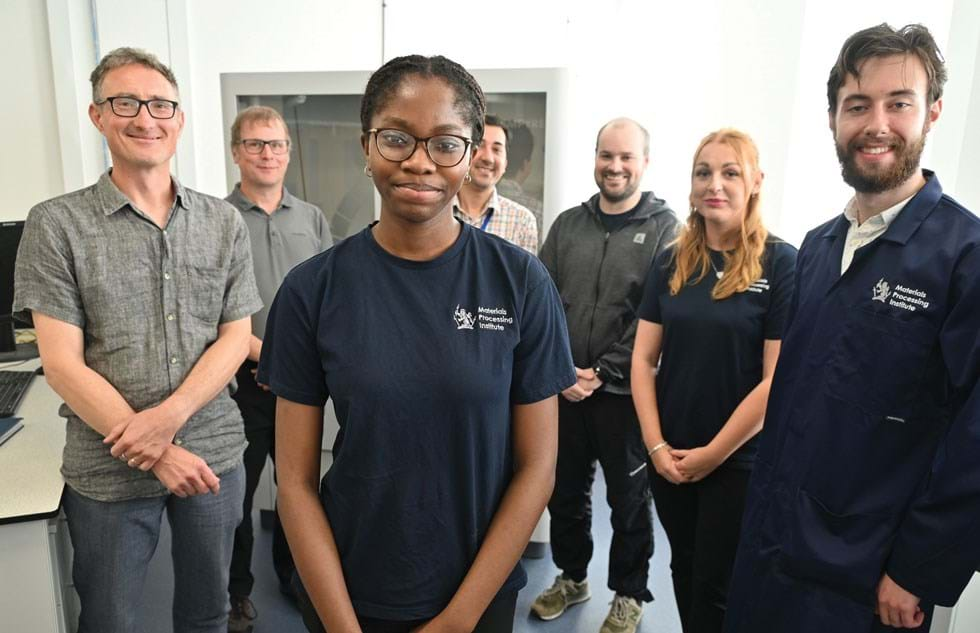A Taste of Industry before Uni
Susan Ojo tells Adam Duckett about how her industrial placement is benefiting her studies
“WE’RE at a time when we’re quite curious. I think we offer a different perspective and can bring more to a company than you think.”
This is Susan Ojo discussing the year-long industrial placement scheme she attended at the Materials Processing Institute (MPI) in Teesside – before starting her studies at Loughborough University.
It may seem unusual to go on an industrial placement before starting your undergraduate course – Susan hasn’t met anyone on her course who has done the same. But the way Susan explains it, she’s already seeing the benefits.
“I had a [university] project on cobalt mining the other week and some of the processes that you use to purify cobalt were being used at the Institute.
They have a piece of equipment that uses a hydrometallurgy process to purify some precious metals from battery waste. So, I was quite familiar with that already. It did help.”
So, what drew Susan to chemical engineering and how did she end up moving more than 250 miles from her home in Kent to the process industry heartland of England’s northeast?
“At first I was looking more at the materials science route [but] I like the application aspect of chemical engineering.”
Keen to avoid travelling a route chosen for her by someone else, Susan found out about the placement opportunity at the MPI through outreach initiatives, including Industrial Cadets and the Engineering Development Trust.
“I knew it would probably help me with my degree…I wanted to learn more about the industry and get a hands-on approach. See things in real life,” she says.
“In the school system you just follow the path that is set out for you. You start here and go on to sixth form or college and on to university.
“You can afford to pause and think about what you want to do rather than just going through the system.”
Plus, Susan says if she hadn’t enjoyed the placement, it would have helped her rethink her choice to study chemical engineering. Fortunately, she found the experience valuable, while gaining useful pointers as to her future career direction.
“I knew it would probably help me with my degree…I wanted to learn more about the industry and get a hands-on approach. See things in real life”

Beyond the pilot trials
Having autonomy on a project was also a valuable experience.
“I did a carbon footprint and energy costing [study] for my group manager. He was pitching solar panels to senior management, so he asked me to look into our energy usage over the last four years. He gave me that brief and the rest was up to me to figure out. I really enjoyed taking ownership and being able to ask around and figure out how to go about that.”
Another highlight was taking part in a young person’s lecture competition organised by the materials institute IOM3.
“It was the first time I’d spoken in front of a group of people and a lot of my colleagues came,” says Susan, who presented the Cement 2 Zero project.
“It was something I really had to push myself to do because I don’t like speaking in front of people or groups of people. I’m really glad I did, and I think I learned a lot about myself. I was able to improve my communication and confidence.”
Wide horizons
Asked whether the experience had helped shape the choices she might make after university, Susan says a big surprise was how much she was interested by the safety aspects of the project. Because of the amount of new equipment coming into the facility there were hazards studies taking place that she sat in on.
“I probably thought it was going to be a bit boring, but it definitely was not. The idea of process safety in general was something I probably wouldn’t have considered for after university, but I definitely am now.”
She expects energy and sustainability might play a big part in her career choices too. She always expected net zero to be part of her future choices, and the placement has helped sharpen that focus.
“I don’t think engineers can get around it, considering the climate. It’s a big problem and I really enjoy problem solving so that is definitely something I’ll look for in whatever industry I go into.” But for now, she says she’s “still setting my horizons quite wide”.

Susan’s advice
I close by asking what lessons she has for those considering going on a placement or hosting one.
First up, Susan says that while she always wanted to live away from home and travel, she hadn’t been prepared for the wrench she felt. “No matter how much you think you want to get away from home, you are probably going to get a bit homesick. I wish somebody had warned me of that.”
Facetiming and visiting her friends at university helped. On the plus side, she says: “I learned so many things in terms of money management, looking after myself, and managing my time. It is something I would really recommend to everyone.”
Susan was living in private student accommodation in Teesside and recommends exploring the new area you find yourself in.
“Try and get out of your room. It can be easy to stay in your bubble, especially when you’re working. I found a lot of groups that were for students that didn’t mind taking in people who were doing a year in industry.”
And for those companies who don’t offer industrial placements for chemical engineering students – or soon-to-be students like Susan, she has this to say: “I think it’s something you really want to consider. I think sometimes people are wary of bringing in a student because it can be quite a lot of work to start with, to get them on board, and helping them figure out what they need to be doing. But once they get started, I think we can be quite curious and offer a different aspect that some people might not see. A fresh set of eyes can always help.”
Recent Editions
Catch up on the latest news, views and jobs from The Chemical Engineer. Below are the four latest issues. View a wider selection of the archive from within the Magazine section of this site.




